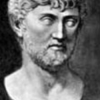Lucretius

Lucretius
Titus Lucretius Caruswas a Roman poet and philosopher. His only known work is the epic philosophical poem De rerum natura about the tenets and philosophy of Epicureanism, and which is usually translated into English as On the Nature of Things...
NationalityRoman
ProfessionPoet
summer spring rain
Many animals even now spring out of the soil, Coalescing from the rains and the heat of the sun. Small wonder, then, if more and bigger creatures, Full-formed, arose from the new young earth and sky. The breed, for instance, of the dappled birds Shucked off their eggshells in the springtime, as Crickets in summer will slip their slight cocoons All by themselves, and search for food and life. Earth gave you, then, the first of mortal kinds, For all the fields were soaked with warmth and moisture.
summer air hands
(On the temperature of water in wells) The reason why the water in wells becomes colder in summer is that the earth is then rarefied by the heat, and releases into the air all the heat-particles it happens to have. So, the more the earth is drained of heat, the colder becomes the moisture that is concealed in the ground. On the other hand, when all the earth condenses and contracts and congeals with the cold, then, of course, as it contracts, it squeezes out into the wells whatever heat it holds.
bitter food
What is food to one is to another bitter poison.
stones doe heavy
If God can do anything he can make a stone so heavy that even he can't lift it. Then there is something God cannot do, he cannot lift the stone. Therefore God does not exist.
food man
What is food to one man is bitter poison to others.
lying mind atheism
True piety lies rather in the power to contemplate the universe with a quiet mind.
fortune morrow doubtful
It is doubtful what fortune to-morrow will bring. [Lat., Posteraque in dubio est fortunam quam vehat aetas.]
light wind white
The gods and their tranquil abodes appear, which no winds disturb, nor clouds bedew with showers, nor does the white snow, hardened by frost, annoy them; the heaven, always pure, is without clouds, and smiles with pleasant light diffused. [Lat., Apparet divom numen, sedesque quietae; Quas neque concutiunt ventei, nec nubila nimbeis. Aspergunt, neque nex acri concreta pruina Cana cadens violat; semper sine nubibus aether Integer, et large diffuso lumine ridet.]
law fixed all-things
All things obey fixed laws.
men understanding mind
How wretched are the minds of men, and how blind their understandings. [Lat., O miseras hominum menteis! oh, pectora caeca!]
infinite endless everlasting
All things keep on in everlasting motion, Out of the infinite come the particles, Speeding above, below, in endless dance.
sea watches shore
Tis pleasant to stand on shore and watch others labouring in a stormy sea.
wind air should
Air, I should explain, becomes wind when it is agitated.
strong law lifetime
Under what law each thing was created, and how necessary it is for it to continue under this, and how it cannot annul the strong rules that govern its lifetime.